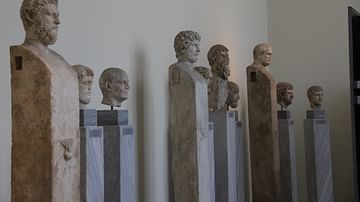Search
Search Results

Article
The Desecration of the Statues of Hermes, 415 BCE
On 7 June 415 BCE, various statues of the god Hermes were desecrated in Athens. The Peloponnesian War (431-404 BCE) had been raging for decades as one of the biggest civil wars in Ancient Greece, and the Athenians prepared for the expedition...

Article
Red Horse's Account of the Battle of the Little Bighorn
Red Horse (Tasunka Luta, l. c. 1822-1907) was a chief of the Miniconjou Lakota Sioux best known for his firsthand account of the Battle of the Little Bighorn (25-26 June 1876) and his 42 ledger book drawings depicting the engagement. The...

Article
The Crusades: Consequences & Effects
The crusades of the 11th to 15th century CE have become one of the defining events of the Middle Ages in both Europe and the Middle East. The campaigns brought significant consequences wherever they occurred but also pushed changes within...

Definition
Amaterasu - Shinto's Greatest Goddess
Amaterasu Omikami ('the Great Divinity Illuminating Heaven') is the sun goddess and most important deity of the Shinto religion. Amaterasu is the ruler of Takama no Hara (the High Celestial Plain), the domain of the kami or spirits. The most...

Definition
William Wallace
Sir William Wallace (c. 1270-1305) was a Scottish knight and national hero who fought for his country's independence from England. Wallace famously led the Scots to victory against a larger English army at the Battle of Stirling Bridge in...

Definition
Persepolis
Persepolis was the capital of the Persian Achaemenid Empire from the reign of Darius I (the Great, r. 522-486 BCE) until its destruction in 330 BCE. Its name comes from the Greek Perses-polis (Persian City), but the Persians knew it as Parsa...

Definition
Artemisia I of Caria
Artemisia I of Caria (l. 480 BCE) was the queen of the Anatolian region of Caria (south of ancient Lydia, in modern-day Turkey). She is most famous for her role in the naval Battle of Salamis in 480 BCE in which she fought for the Persians...

Definition
Louis-Antoine de Saint-Just
Louis-Antoine de Saint-Just (1767-1794) was a prominent figure of the French Revolution (1789-1799). After his election to the National Convention in September 1792, he led the push for the execution of King Louis XVI of France (r. 1774-1792...

Definition
Christopher Marlowe - Poet, Playwright, Spy
Christopher Marlowe (1564-1593), or Kit Marlowe, was a poet and playwright of the English Renaissance who wrote during the Elizabethan Era (1558-1603). His mastery of the blank verse – unrhymed iambic pentameter – transformed the way plays...

Definition
Chief Joseph (Eastman's Biography)
Chief Joseph (Heinmot Tooyalakekt, l. 1840-1904) was the leader of the Wallowa band of the Nez Perce Native American nation, who, in 1877, resisted forced relocation from his ancestral lands in the Wallowa Valley of northeastern Oregon and...